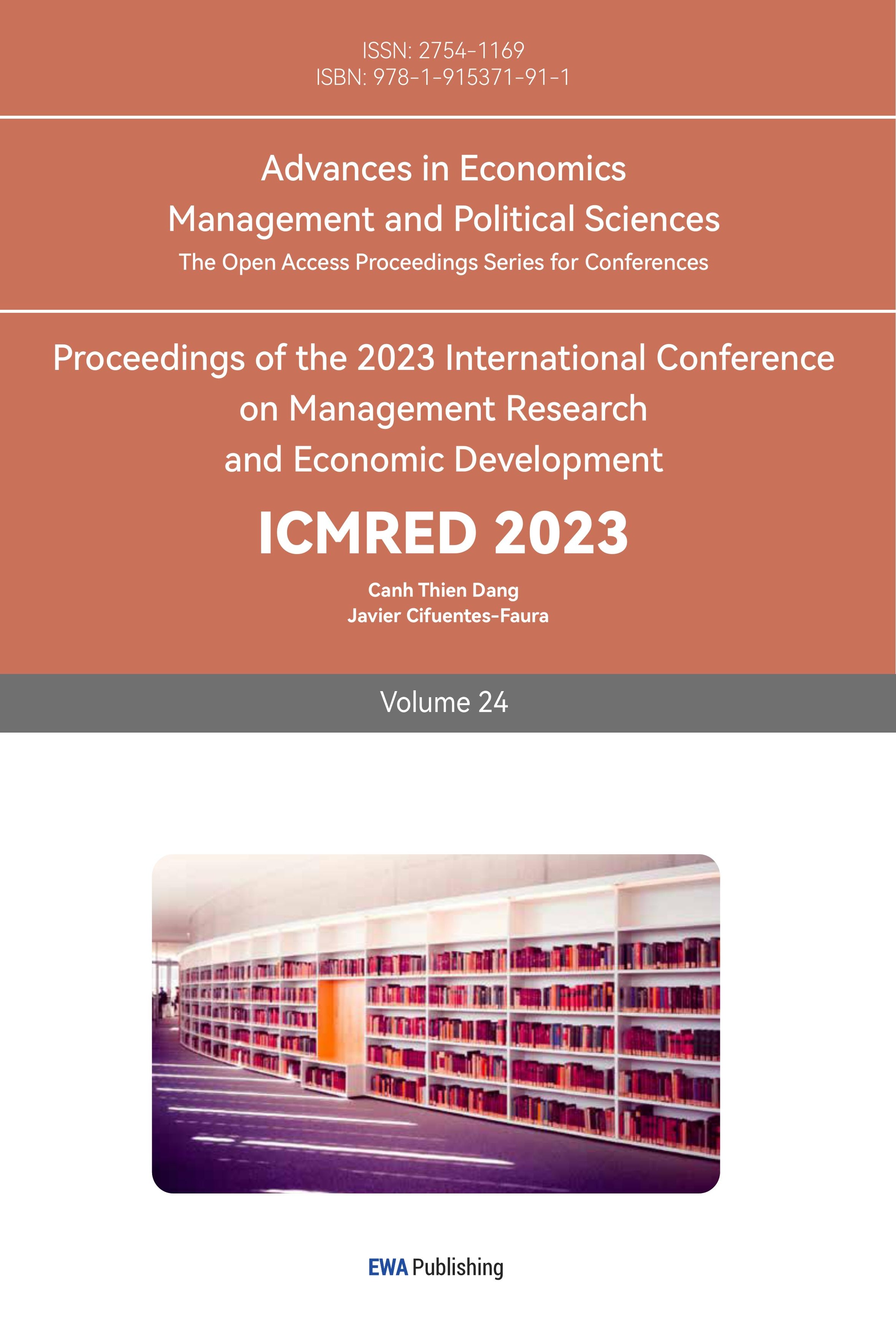References
[1]. Wu, Q., Tambunlertchai, K., & Pornchaiwiseskul, P. (2021b). Examining the Impact and Influencing Channels of Carbon Emission Trading Pilot Markets in China. Sustainability, 13(10), 5664.
[2]. Dabringhaus, S. (2018). PERSPECTIVES ON THE ENVIRONMENTAL HISTORY OF CHINA. Journal of Chinese History =, 2(2), 281–290.
[3]. Zhao, X., Zhang, Y., Liang, J., Li, Y., Jia, R., & Wang, L. (2018). The Sustainable Development of the Economic-Energy-Environment (3E) System under the Carbon Trading (CT) Mechanism: A Chinese Case. Sustainability, 10(2), 98.
[4]. Zhang, W., Li, J., Li, G., & Guo, S. (2020). Emission reduction effect and carbon market efficiency of carbon emissions trading policy in China. Energy, 196, 117117.
[5]. Chang, C., Mai, T., & McAleer, M. (2018b). PRICING CARBON EMISSIONS IN CHINA. Annals of Financial Economics, 13(03), 1850014.
[6]. Tian, H., Lin, J., & Jiang, C. (2022). The Impact of Carbon Emission Trading Policies on Enterprises’ Green Technology Innovation—Evidence from Listed Companies in China. Sustainability, 14(12).
[7]. Xuan, D., Ma, X., & Shang, Y. (2020). Can China’s policy of carbon emission trading promote carbon emission reduction? Journal of Cleaner Production, 270, 122383.
[8]. Bretschger, Lucas; Zhang, Lin (2014): Carbon policy in a high-growth economy: The case of China, Economics Working Paper Series, No. 14/201, ETH Zurich, CERETH - Center of Economic Research, Zurich.
[9]. Notice On Doing a Good Job in the Allocation of Quotas for National Carbon Emissions Trading in 2021 and 2022_Other_Chinese Government Network. (n.d.). http://www.gov.cn/zhengce/zhengceku/2023-03/16/content_5747106.htm
[10]. Hu, H., Dong, W., & Zhou, Q. (2021). A comparative study on the environmental and economic effects of a resource tax and carbon tax in China: Analysis based on the computable general equilibrium model. Energy Policy, 156, 112460.
[11]. Hu, H., Dong, W., & Zhou, Q. (2021). A comparative study on the environmental and economic effects of a resource tax and carbon tax in China: Analysis based on the computable general equilibrium model. Energy Policy, 156, 112460.
[12]. Zhang, W., Li, J., Li, G., & Guo, S. (2020). Emission reduction effect and carbon market efficiency of carbon emissions trading policy in China. Energy, 196, 117117.
Cite this article
Yang,Z. (2023). China's Carbon Emission Policies and High-quality Economic Development: Stylized Facts and Prospect. Advances in Economics, Management and Political Sciences,24,262-267.
Data availability
The datasets used and/or analyzed during the current study will be available from the authors upon reasonable request.
Disclaimer/Publisher's Note
The statements, opinions and data contained in all publications are solely those of the individual author(s) and contributor(s) and not of EWA Publishing and/or the editor(s). EWA Publishing and/or the editor(s) disclaim responsibility for any injury to people or property resulting from any ideas, methods, instructions or products referred to in the content.
About volume
Volume title: Proceedings of the 2023 International Conference on Management Research and Economic Development
© 2024 by the author(s). Licensee EWA Publishing, Oxford, UK. This article is an open access article distributed under the terms and
conditions of the Creative Commons Attribution (CC BY) license. Authors who
publish this series agree to the following terms:
1. Authors retain copyright and grant the series right of first publication with the work simultaneously licensed under a Creative Commons
Attribution License that allows others to share the work with an acknowledgment of the work's authorship and initial publication in this
series.
2. Authors are able to enter into separate, additional contractual arrangements for the non-exclusive distribution of the series's published
version of the work (e.g., post it to an institutional repository or publish it in a book), with an acknowledgment of its initial
publication in this series.
3. Authors are permitted and encouraged to post their work online (e.g., in institutional repositories or on their website) prior to and
during the submission process, as it can lead to productive exchanges, as well as earlier and greater citation of published work (See
Open access policy for details).
References
[1]. Wu, Q., Tambunlertchai, K., & Pornchaiwiseskul, P. (2021b). Examining the Impact and Influencing Channels of Carbon Emission Trading Pilot Markets in China. Sustainability, 13(10), 5664.
[2]. Dabringhaus, S. (2018). PERSPECTIVES ON THE ENVIRONMENTAL HISTORY OF CHINA. Journal of Chinese History =, 2(2), 281–290.
[3]. Zhao, X., Zhang, Y., Liang, J., Li, Y., Jia, R., & Wang, L. (2018). The Sustainable Development of the Economic-Energy-Environment (3E) System under the Carbon Trading (CT) Mechanism: A Chinese Case. Sustainability, 10(2), 98.
[4]. Zhang, W., Li, J., Li, G., & Guo, S. (2020). Emission reduction effect and carbon market efficiency of carbon emissions trading policy in China. Energy, 196, 117117.
[5]. Chang, C., Mai, T., & McAleer, M. (2018b). PRICING CARBON EMISSIONS IN CHINA. Annals of Financial Economics, 13(03), 1850014.
[6]. Tian, H., Lin, J., & Jiang, C. (2022). The Impact of Carbon Emission Trading Policies on Enterprises’ Green Technology Innovation—Evidence from Listed Companies in China. Sustainability, 14(12).
[7]. Xuan, D., Ma, X., & Shang, Y. (2020). Can China’s policy of carbon emission trading promote carbon emission reduction? Journal of Cleaner Production, 270, 122383.
[8]. Bretschger, Lucas; Zhang, Lin (2014): Carbon policy in a high-growth economy: The case of China, Economics Working Paper Series, No. 14/201, ETH Zurich, CERETH - Center of Economic Research, Zurich.
[9]. Notice On Doing a Good Job in the Allocation of Quotas for National Carbon Emissions Trading in 2021 and 2022_Other_Chinese Government Network. (n.d.). http://www.gov.cn/zhengce/zhengceku/2023-03/16/content_5747106.htm
[10]. Hu, H., Dong, W., & Zhou, Q. (2021). A comparative study on the environmental and economic effects of a resource tax and carbon tax in China: Analysis based on the computable general equilibrium model. Energy Policy, 156, 112460.
[11]. Hu, H., Dong, W., & Zhou, Q. (2021). A comparative study on the environmental and economic effects of a resource tax and carbon tax in China: Analysis based on the computable general equilibrium model. Energy Policy, 156, 112460.
[12]. Zhang, W., Li, J., Li, G., & Guo, S. (2020). Emission reduction effect and carbon market efficiency of carbon emissions trading policy in China. Energy, 196, 117117.









